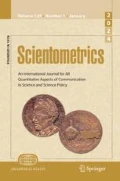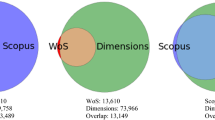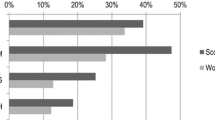Abstract
We compared general and specialized databases, by searching bibliographic information regarding journal articles in the computer science field, and by evaluating their bibliographic coverage and the quality of the bibliographic records retrieved. We selected a sample of computer science articles from an Italian university repository (AIR) to carry out our comparison. The databases selected were INSPEC, Scopus, Web of Science (WoS), and DBLP. We found that DBLP and Scopus indexed the highest number of unique articles (4.14 and 4.05 % respectively), that each of the four databases indexed a set of unique articles, that 12.95 % of the articles sampled were not indexed in any of the databases selected, that Scopus was better than WoS for identifying computer science publications, and that DBLP had a greater number of unique articles indexed (19.03 %), when compared to INSPEC (11.28 %). We also measured the quality of a set of bibliographic records, by comparing five databases: Scopus, WoS, INSPEC, DBLP and Google Scholar (GS). We found that WoS, INSPEC and Scopus provided better quality indexing and better bibliographic records in terms of accuracy, control and granularity of information, when compared to GS and DBLP. WoS and Scopus also provided more sophisticated tools for measuring trends of scholarly publications.
Similar content being viewed by others
References
Abrizah, A., Zainab, A. N., Kiran, K., & Raj, R. G. (2013). LIS journals scientific impact and subject categorization: A comparison between Web of Science and Scopus. Scientometrics, 94(2), 721–740.
Adriaanse, L. S., & Rensleigh, C. (2013). Web of Science, Scopus and Google Scholar a content comprehensiveness comparison. Electronic Library, 31(6), 727–744.
Aguillo, I. F. (2012). Is Google Scholar useful for bibliometrics? A webometric analysis. Scientometrics, 91(2), 343–351.
Archambault, É., Campbell, D., Gingras, Y., & Larivière, V. (2009). Comparing bibliometric statistics obtained from the Web of Science and Scopus. Journal of the American Society for Information Science and Technology, 60(7), 1320–1326.
Archivio Istituzionale della Ricerca. (2014). Retrieved April 11, 2014 from http://air.unimi.it.articles/000553/article.pdf
Bakkalbasi, N., Bauer, K., Glover, J., & Wang, L. (2006). Three options for citation tracking: Google Scholar, Scopus and Web of Science. Biomedical Digital Libraries, 3(1), 7.
Bar-Ilan, J. (2008). Which h-Index? A comparison of WoS, Scopus and Google Scholar. Scientometrics, 74, 257–271.
Bar-Ilan, J. (2010). Citations to the “introduction to informetrics” indexed by WoS. Scopus and Google Scholar. Scientometrics, 82(3), 495–506.
Bar-Ilan, J., Levene, M., & Lin, A. (2007). Some measures for comparing citation databases. Journal of Informetrics, 1, 26–34.
Bartol, T., Budimir, G., Dekleva-Smrekar, D., Pusnik, M., & Juznic, P. (2014). Assessment of research fields in Scopus and Web of Science in the view of national research evaluation in Slovenia. Scientometrics, 98(2), 1491–1504.
Bellini, E., & Nesi, P. (2013). Metadata quality assessment tool for open access cultural heritage institutional repositories.In Proceeding of the ECLAP 2013 Conference, 2nd International Conference on Information Technologies for performing arts, media access and entertainment, ECLAP 2013, Lecture Notes in Computer Science, LNCS 7990 (pp. 90–103) Springer.
Bosman, J., van Mourik, I., Rasch, M., Sieverts, E., & Verhoeff, H. (2006). Scopus reviewed and compared. The coverage and functionality of the citation database Scopus, including comparisons with Web of Science and Google Scholar, Utrecht: Utrecht University Library. Retrieved from http://dspace.library.uu.nl/handle/1874/18247
Cassella, M., & Morando, M. (2012). Fostering new roles for librarians: Skills sets for repository managers—Results of a survey in Italy. LIBER Quarterly, 21, 407–428. Retrieved from http://liber.library.uu.nl/publish/
De Sutter, B., & Van Den Oord, A. (2012). To be or not to be cited in Computer Science. Communications of the ACM, 55(8), 69–75.
de Winter, J. C. F., Zadpoor, A. A., & Dodou, D. (2014). The expansion of Google Scholar versus Web of Science: A longitudinal study. Scientometrics, 98(2), 1547–1565.
Fiala, D. (2012). Bibliometric analysis of CiteSeer data for countries. Information Processing and Management, 48(2), 242–253.
Franceschet, M. (2010). A comparison of bibliometric indicators for computer science scholars and journals on Web of Science and Google Scholar. Scientometrics, 83(1), 243–258.
Freyne, J., Coyle, L., Smyth, B., & Cunningham, P. (2010). Relative status of journal and conference publications in Computer Science. Communications of the ACM, 53(11), 124–132.
Gasparyan, A. Y., Ayvazyan, L., & Kitas, G. D. (2013). Multidisciplinary bibliographic databases. Journal of Korean Medical Science, 28(9), 1270–1275.
Giles, C. L., Bollacker, K. D., & Lawrence, S. (1998). CiteSeer: an automatic citation indexing system. Proceedings of the third ACM conference on Digital libraries: 89–98. doi:10.1145/276675.276685. ISBN 0-89791-965-3. CiteSeerX:10.1.1.30.6847.
González-Alcaide, G., Valderrama-Zurián, J. C., & Aleixandre-Benavent, R. (2012). The impact factor in non-English-speaking countries. Scientometrics, 92(2), 297–311.
Gorraiz, J., & Schloegl, C. (2008). A bibliometric analysis of pharmacology and pharmacy journals: Scopus versus Web of Science. Journal of Information Science, 34(5), 715–725.
Kousha, K., & Thelwall, M. (2007). Google Scholar citations and Google Web/URL citations: A multi-discipline exploratory analysis. Journal of the American Society for Information Science and Technology, 58(7), 1055–1065.
Ley, M. (2009). DBLP: Some lessons learned. Proceedings of the VLDB Endowment, 2(2), 1493–1500.
Liang, L., Rousseau, R., & Zhong, Z. (2013). Non-English journals and papers in physics and chemistry: Bias in citations? Scientometrics, 95(1), 333–350.
Meho, L., & Yang, K. (2007). Impact of data sources on citation counts and rankings of LIS faculty: Web of Science versus Scopus and Google Scholar. Journal of the American Society for Information Science and Technology, 58(13), 2105–2125.
Orduña-Malea, E., Ayllón, J. M., Martín-Martín, A., & López-Cózar, E. D. (2014). Empirical evidences in citation-based search engines: Is microsoft academic search dead? Granada: EC3 Reports, 16: May 21, 2014. arXiv:1404.7045 [cs.DL]. Retrieved from http://arxiv.org/abs/1404.7045
Palavitsinis, N., Manouselis, N., & Sanchez-Alonso, S. (2014). Metadata quality in digital repositories: Empirical results from the cross-domain transfer of a quality assurance process. Journal of the Association for Information Science and Technology, 65(6), 1202–1216.
Petricek, V., Cox, I. J., Han, H., Councill, I. G., & Giles, C. L. (2005). A comparison of on-line computer science citation databases. In A. Rauber, S. Christodoulakis, & A. M. Tjoa (Eds.) ECDL 2005. LNCS (vol. 3652, pp. 438–449). Heidelberg: Springer.
Sicilia, M., Sánchez-Alonso, S., & García-Barriocanal, E. (2011). Comparing impact factors from two different citation databases: The case of Computer Science. Journal of Informetrics, 5(4), 698–704.
Top Institutionals. (2014). Retrieved April 11, 2014 from http://repositories.webometrics.info/en/top_Inst?sort=asc&order=scholar
Ugoljni, D., & Casilli, C. (2003). The visibility of Italian journals. Scientometrics, 56(3), 345–355.
Vieira, E. S., & Gomes, J. A. N. F. (2009). A comparison of Scopus and Web of Science for a typical university. Scientometrics, 81(2), 587–600.
Wainer, J., Billa, C., & Goldenstein, S. (2011). Invisible work in standard bibliometric evaluation of Computer Science. Communications of the ACM, 54(5), 141–148.
Whitley, K. M. (2002). Analysis of SciFinder Scholar and Web of Science citation searches. Journal of the American Society for Information Science and Technology, 53(14), 1210–1215.
Wolfram, D. (2003). Applied informetrics for information retrieval research. Westport: Libraries Unlimited Inc.
Ze, H., & Bo, Y. (2012). Mining Google Scholar citations: An exploratory study. ICIC 2012, LNCS 7389, pp. 182–189.
Zhang, L. (2014). The impact of data source on the ranking of computer scientists based on citation indicators: A comparison of Web of Science and Scopus. Issues in Science and Technology Librarianship, 75. Retrieved from http://www.istl.org/14-winter/refereed2.html.
Zhang, L., & Glänzel, W. (2012). Proceeding papers in journals versus the “regular” journal publications. Journal of Informetrics, 6(1), 88–96.
Author information
Authors and Affiliations
Corresponding author
Rights and permissions
About this article
Cite this article
Cavacini, A. What is the best database for computer science journal articles?. Scientometrics 102, 2059–2071 (2015). https://doi.org/10.1007/s11192-014-1506-1
Received:
Published:
Issue Date:
DOI: https://doi.org/10.1007/s11192-014-1506-1




